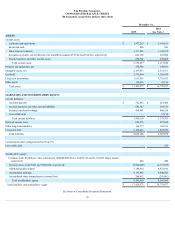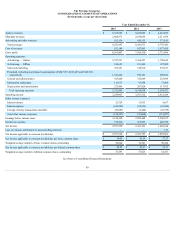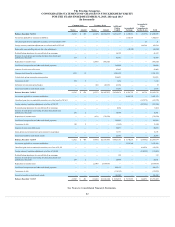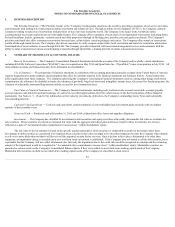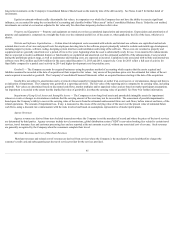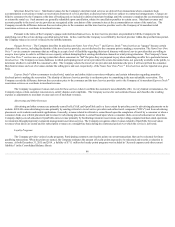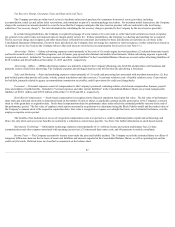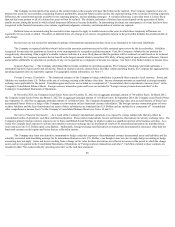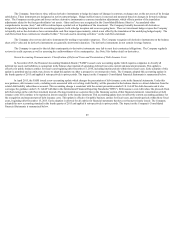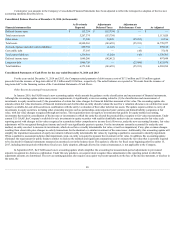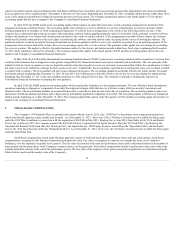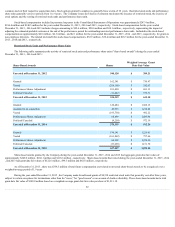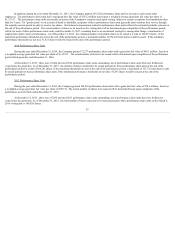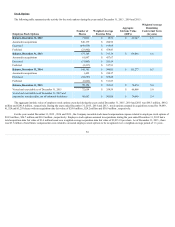Priceline 2015 Annual Report Download - page 88
Download and view the complete annual report
Please find page 88 of the 2015 Priceline annual report below. You can navigate through the pages in the report by either clicking on the pages listed below, or by using the keyword search tool below to find specific information within the annual report.
The Priceline Group Inc.
NOTES TO CONSOLIDATED FINANCIAL STATEMENTS
1. BUSINESS DESCRIPTION
The Priceline Group Inc. ("The Priceline Group" or the "Company") helps people experience the world by providing consumers, travel service providers
and restaurants with leading travel and restaurant online reservation and related services. Through its online travel companies ("OTCs"), the Company connects
consumers wishing to make travel reservations with providers of travel services around the world. The Company is the leader in the worldwide online
accommodation reservation market based on room nights booked. The Company offers consumers a broad array of accommodation reservations (including hotels,
bed and breakfasts, hostels, apartments, vacation rentals and other properties) through its Booking.com, priceline.com and agoda.com brands. The Company's
priceline.com brand also offers consumers reservations for rental cars, airline tickets, vacation packages and cruises. The Company offers rental car reservations
worldwide through rentalcars.com. The Company also allows consumers to easily compare airline ticket, hotel reservation and rental car reservation information
from hundreds of travel websites at once through KAYAK. The Company provides restaurants with reservation management services and consumers with the
ability to make restaurant reservations at participating restaurants through OpenTable, a leading provider of online restaurant reservations.
2. SUMMARY OF SIGNIFICANT ACCOUNTING POLICIES
Basis of Presentation — The Company's Consolidated Financial Statements include the accounts of the Company and its wholly-owned subsidiaries,
including KAYAK Software Corporation ("KAYAK") since its acquisition in May 2013 and OpenTable, Inc. ("OpenTable") since its acquisition in July 2014. All
intercompany accounts and transactions have been eliminated in consolidation.
Use of Estimates — The preparation of financial statements in conformity with accounting principles generally accepted in the United States of America
requires management to make estimates and assumptions that affect the amounts reported in the financial statements and footnotes thereto. Actual results may
differ significantly from those estimates. The estimates underlying the Company's Consolidated Financial Statements relate to, among other things, stock-based
compensation, the allowance for doubtful accounts, the valuation of goodwill, long-lived assets and intangibles, income taxes, the accrual for loyalty programs, the
valuation of redeemable noncontrolling interests and the accrual for travel transaction taxes.
Fair Value of Financial Instruments — The Company's financial instruments, including cash, restricted cash, accounts receivable, accounts payable,
accrued expenses and deferred merchant bookings, are carried at cost which approximates their fair value because of the short-term nature of these financial
instruments. See Notes 4 , 5 , 10 and 12 for information on fair value for investments, derivatives, the Company's outstanding Senior Notes and redeemable
noncontrolling interests.
Cash and Cash Equivalents — Cash and cash equivalents consists primarily of cash and highly liquid investment grade securities with an original
maturity of three months or less.
Restricted Cash — Restricted cash at December 31, 2015 and 2014 collateralizes office leases and supplier obligations.
Investments — The Company has classified its investments in debt securities and equity securities with readily determinable fair value as available-for-
sale securities. These securities are carried at estimated fair value with the aggregate unrealized gains and losses related to these investments, net of taxes,
reflected as a part of " Accumulated other comprehensive income (loss) " within stockholders' equity.
The fair value of the investments is based on the specific quoted market price of the securities or comparable securities at the balance sheet dates.
Investments in debt securities are considered to be impaired when a decline in fair value is judged to be other than temporary because the Company either intends
to sell or it is more-likely-than not that it will have to sell the impaired security before recovery. Once a decline in fair value is determined to be other than
temporary, an impairment charge is recorded and a new cost basis in the investment is established. If the Company does not intend to sell the debt security, but it
is probable that the Company will not collect all amounts due, then only the impairment due to the credit risk would be recognized in earnings and the remaining
amount of the impairment would be recognized in " Accumulated other comprehensive income (loss) " within stockholders' equity. Marketable securities are
presented as current assets on the Company's Consolidated Balance Sheets if they are available to meet short-term working capital needs of the Company.
Marketable debt securities not held to meet short-term working capital needs of the Company are classified as short-term or
84






